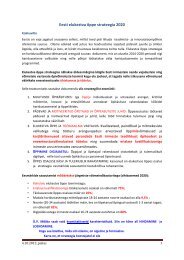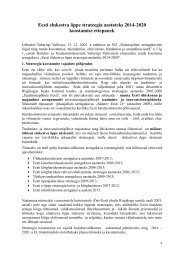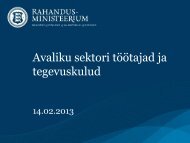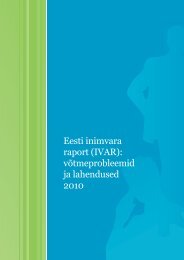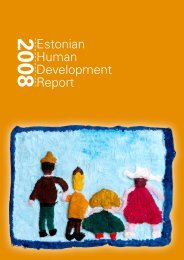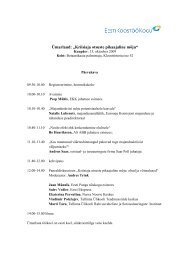DEVELOPMENT
The pdf-version - Eesti Koostöö Kogu
The pdf-version - Eesti Koostöö Kogu
Create successful ePaper yourself
Turn your PDF publications into a flip-book with our unique Google optimized e-Paper software.
References<br />
1. Acemoglu, D.; Robinson, J. (2012) Why Nations Fail: The Origins<br />
of Power, Prosperity and Poverty. Profile Books Ltd.<br />
2. Apolte, T.; Peters, H. (2009) Governance, Demokratie und<br />
wirtschaftliche Entwicklung in den ehemaligen sozialistischen<br />
Staaten. IÖB-Diskussionspapier, No. 1/09, http://hdl.handle.<br />
net/10419/39080.<br />
3. Eicher, T.; Röhn, O. (2007), “Institutional Determinants of<br />
Economic Performance in OECD Countries – An Institutions<br />
Climate Index”, CESifo DICE Report 5(1), 38–49.<br />
4. Gwartney, J., Lawson, R. (2007) Economic Freedom of the World:<br />
2005 Annual Report. Vancouver et al.: Fraser Institute et al.<br />
5. Heritage Foundation (HF). Index of Economic Freedom. http://<br />
www.heritage.org/index/<br />
6. Homann, K.; Suchanek, A. (2012). Sissejuhatus ökonoomikasse.<br />
TÜ Kirjastus. E-raamat.<br />
7. Human Development Report (HDR). http://hdr.undp.org/en/<br />
8. IMD. World Competitivness Yearbook. http://www.imd.org/<br />
research/publications/wcy/index.cfm<br />
9. Kuncic, A. (2012). Institutional quality database, online statistical<br />
appendix. http://sites.google.com/site/aljazkuncic/institutional-factor-scores.<br />
[Online; accessed 01-February-2012].<br />
10. Leschke, M. (2011). Ökonomik der Entwicklung – Eine Einführung<br />
aus institutionenökonomischen Sicht. Verlag NMP.<br />
11. North, D. (1990) Institutions, Institutional Change and Economic<br />
Performance. Cambridge: Cambridge University Press.<br />
Estonian translation: Institutsioonid, institutsiooniline muutus ja<br />
majandusedu. Tartu: Fontes Publishers, 2004.<br />
12. North, D.; Wallis, J.; Weingast, B. (2006) Violence and Social<br />
Orders: A Conceptual Framework for Interpreting Recorded<br />
Human History. Cambridge University Press.<br />
13. Sepp, Jüri (2006). “Effects of Institutional Factors and Human<br />
Capital on Countries’ Economic Potential and Growth,” Business<br />
Interaction in a Global Economy. Wilkes, Beijing: COPE International,<br />
69 –82.<br />
14. Sepp, J.; Eerma, D. (2007). “Institutional Factors Impact on Countries<br />
Economic Growth.” Economic Development, Environment,<br />
Energy and Ethics in a Global Economy. Wilkes, COPE International,<br />
269 – 278.<br />
15. Sepp, J.; Eerma, D. (2011). “Why Economic Development Deviates<br />
from Human Development,” Central European Review of Economics<br />
and Finance, 1(1), 11 – 25.<br />
16. Trabold, H. (1995) “Die internationale Wettbewerbsfähigkeit<br />
einer Volkswirtschaft,” Deutsches Institut für Wirtschaftsforschung,<br />
Vierteljahreshefte zur Wirtschaftsforschung, Heft 2, 64.<br />
Jg. Berlin, 169.<br />
17. World Bank. Doing Business. http://www.doingbusiness.org/<br />
18. World Bank. Worldwide Governance Indicators. http://info.<br />
worldbank.org/governance/wgi/index.asp<br />
19. World Economic Forum. The Global Competitiveness Report.<br />
http://www.weforum.org/issues/global-competitiveness<br />
20. Wrobel, R. (2000) Estland und Europa: Die Bedeutung des<br />
Systemwttbewerbs für die Evolution und Transformation von<br />
Wirtschaftssysteme. University of Tartu Press.<br />
21. Wölfl, A., I. Wanner, T. Kozluk, G. Nicoletti (2009), “Ten years<br />
of product market reform in OECD countries – insights from a<br />
revised PMR indicator”, OECD Economics Department Working<br />
Paper No 695, OECD, Paris.<br />
Estonian Human Development Report 2012/2013<br />
157



